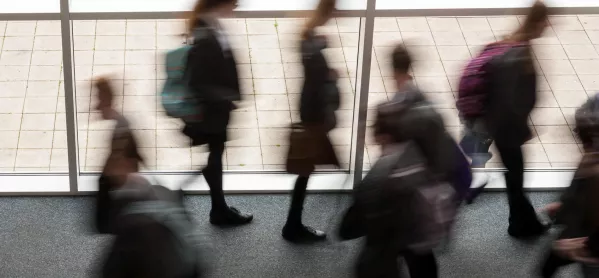- Home
- Teachers feel ‘guilty’ about taking care of themselves
Teachers feel ‘guilty’ about taking care of themselves

Teachers must be encouraged to pay attention to their own wellbeing and not feel “guilt or shame” for doing so, the chief executive of a mental health charity has said.
Sinead McBrearty, chief executive of the Education Support Partnership, told a conference in London today that teachers and school leaders need to consider themselves as “elite athletes in the field of relationships”.
Quick read: ‘Steep rise’ in teachers struggling with mental health
Wellbeing: Hinds unveils latest plan to create ‘happy teachers’
Viewpoint: Too many teachers still fear being honest about their mental health
“Too many people in the sector feel shame and guilt at the idea of taking care of themselves, and we have to address this because they cannot do what we ask them to do if they are not able to say, ‘Do you know what: this is a valuable use of time and this is going to enable me to do a better job.’”
Ms McBrearty, who was speaking at the Westminster Education Forum, referred to the charity’s research published earlier this year which found a “steep rise” in the number of education staff who were contacting its helpline with severe mental health issues - with, on average, two callers a day clinically assessed as at risk of suicide.
She called for all people working in schools should have access to counselling as a preventative measure saying that as the awareness of the widespread nature of trauma and its impact on children grew, there should be a similar awareness of the need to support those working with children.
“Our understanding of how these issues impact individuals has changed and we need to change our response,” Ms McBrearty said.
“We cannot leave teachers dealing with this, as the frontline of a mental health service, unsupported. Social workers wouldn’t have it, nobody else would attempt to deal with this degree of complexity without proper support in place and through the expert advisory group that is something I’m banging on about.
“It’s time we started looking after the people who look after the kids.”
Her comments came after it was revealed that teachers in England work some of the longest hours in the world - but most of this time is not spent teaching. Instead, it is spent on planning, marking and admin.
Speaking after the meeting, Ms McBrearty said that she was “so struck” by how many teachers feel that if they turn attention to themselves that is somehow taking away from the children they work with.
She said: “I spoke to a head who said that she very heavily protected the time between 3pm and 5pm on Sunday afternoon to spend time with her family. The implication of that, is that no other time was protected. That is very tough on somebody’s home life.”
Ms McBrearty added that self-care was about having time to properly rest.
“Not working is not the same as resting,” she said. “You may not be working but still have a head full of work. Resting is genuinely switching off, genuinely allowing yourself to be absorbed by something else which is energising for you.”
And she added that while emotionally-intelligent leadership could reduce workload and increase support for teachers, leaders themselves were also at risk of being overwhelmed and that workload and mental health support were system-wide issues.
Register with Tes and you can read two free articles every month plus you'll have access to our range of award-winning newsletters.
Keep reading with our special offer!
You’ve reached your limit of free articles this month.
- Unlimited access to all Tes magazine content
- Save your favourite articles and gift them to your colleagues
- Exclusive subscriber-only stories
- Over 200,000 archived articles
- Unlimited access to all Tes magazine content
- Save your favourite articles and gift them to your colleagues
- Exclusive subscriber-only stories
- Over 200,000 archived articles



